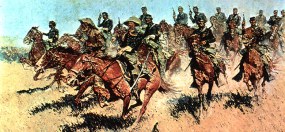When people talk about original sin, they love to point to toddlers committing two obvious sins: lying and screaming “MINE!” all the time. It’s so desperate and obvious it makes us laugh.
Nobody laughs when adults do it, though.
Which is why I am bothered by the sudden eruption of Christians, most of them political conservatives, who are screaming “MINE!” when they don’t like the idea of the government redistributing wealth. It’s not that I don’t blame them.  I’m very sympathetic. I don’t like the government taking my money and giving it to someone else, either.
I’m very sympathetic. I don’t like the government taking my money and giving it to someone else, either.
Did you notice the word my in that last sentence? Think about that for a moment. Then think about this: It’s a very short trip from complaining about giving money to the government so the government can give it to other people who may need it to complaining about giving money to the Lord so the Church can give it to other people who may need it.
The Bible says this:
For you have died, and your life is hidden with Christ in God.
—Colossians 3:3I have been crucified with Christ. It is no longer I who live, but Christ who lives in me. And the life I now live in the flesh I live by faith in the Son of God, who loved me and gave himself for me.
—Galatians 2:20
Part of what made the early Church so radical to the Jews is that they got the concept of being dead. They understood it legally and spiritually. Someone declared legally dead could no longer be said to own anything. And spiritually, they understood it based on what John the Baptist initiated and Jesus advocated as the way of fulfilling all righteousness:
Do you not know that all of us who have been baptized into Christ Jesus were baptized into his death? We were buried therefore with him by baptism into death, in order that, just as Christ was raised from the dead by the glory of the Father, we too might walk in newness of life.
—Romans 6:3-4
When you and I went down in that water, what came up from it was new. Whatever we were died. And what emerged from that water had no claims on the old life and the things of the world, for that new person was dead to those things, a new life now joined to Christ in His death.
This is why baptism has seen its meaning diminish in most churches today: We don’t stress that the person who comes out of that water is not the person who went in. We don’t talk about the burial. We don’t mention the old life that was abandoned for a new one that has us living as if all you and I own now is Christ, for we are in Him, and all we have is Him.
Those in the early Church understood the full meaning, though, which is why they could say what they did:
Now the full number of those who believed were of one heart and soul, and no one said that any of the things that belonged to him was his own, but they had everything in common.
—Acts 4:32
Many will reply that I’m opposing capitalism. That’s the usual retort. But the truth is that I haven’t seen genuine capitalism in a long time. Genuine capitalism is a fantastic economic system in the hands of God-fearing people. In the hands of such godly people it works beautifully on a local scale for they balance the health of the local community against any race to the price bottom by any one controlling interest.
But the truth is that capitalism today is run by people who do not fear God. Such godless people long ago abandoned the health of the local economy in favor of globalism, where all that matters is the lowest possible price—which means that someone inevitably suffers for that price because community loses all meaning when the entire planet is involved.
Plenty of Christians make excuses for the condition of capitalism today. If I read my Bible correctly, though, I can’t see that God was ever keen on excuses.
Capitalism, socialism, communism—all have their evils. But the one system I never hear enough about, the one that is 100 percent evil-free is God’s system, the Kingdom (or call it Kingdomism, if you like).
The economy of God’s Kingdom is made up of people who died to self and gave up the childish notion of “MINE!” These people are puzzled by arguments in favor of 10 percent, because each of them realizes that all that is around them is in play at all times for the Lord and His Kingdom. Their lives and everything in them are 100 percent purchased and owned by Jesus.
We live in what some have deemed a “praise & worship generation.” I would argue that few of us understand what genuine worship is, especially in the context of our death and burial in Christ.
This classic verse says it all:
I appeal to you therefore, brothers, by the mercies of God, to present your bodies as a living sacrifice, holy and acceptable to God, which is your spiritual worship.
—Romans 12:1
We are the sacrifice. And just a little study shows us from the Scriptures that what is sacrificed is never intended to get up from the altar, dust itself off, and go on as if nothing happened. No, the outcome for the sacrifice is death. And it isn’t a 10 percent death or even a generous 15 percent one, but 100 percent.
But that is my worship: 100 percent of all I am and anything connected to me. That is the life that fully celebrates Jesus and worships Him in Spirit and in truth.
Do we understand how far we are from the ways of the Kingdom? I know I do. And I understand it more each day. I want to crawl off the altar of sacrifice. I don’t want to be dead. I like “MINE!” too much, too.
Yet as each day passes, I enjoy that kind of compromised, half-dead, zombie-like existence less and less. Now, I can see what Jesus intended. And it is so much more than any of us can comprehend.
I want to be fully dead. It’s the only way to truly live.

 The trumpet cry as the rescuers spurred on their chargers. The enemy routed.
The trumpet cry as the rescuers spurred on their chargers. The enemy routed.